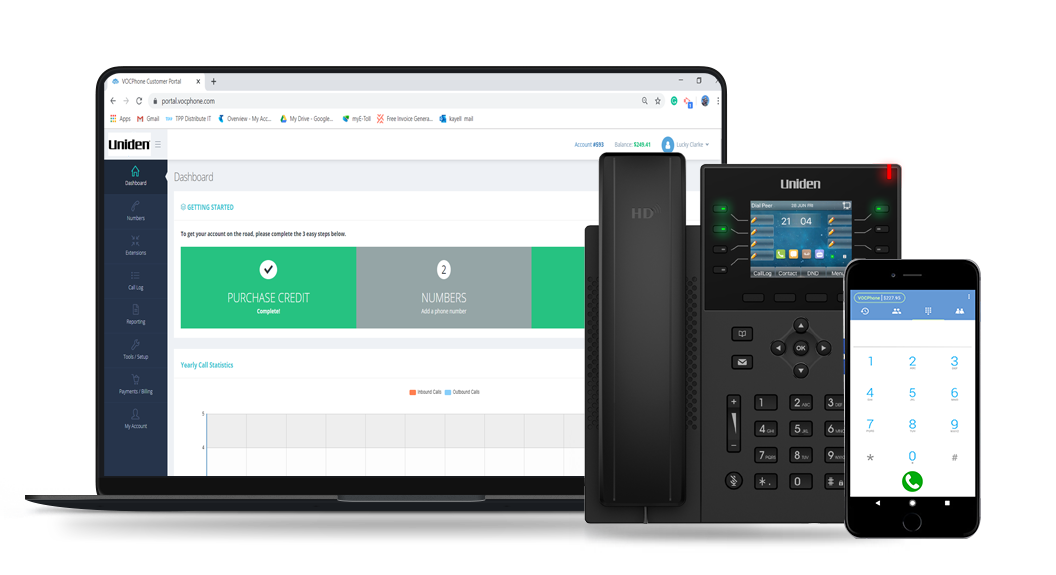
Make smarter decisions with your IP phones in Australia
Choosing the right IP phones in Australia can elevate your business communications if you avoid these costly pitfalls. Learn what to watch out for.

Choosing the right IP phones in Australia can elevate your business communications if you avoid these costly pitfalls. Learn what to watch out for.
When it comes to upgrading your business communications, IP phones are becoming the standard in Australia. They’re flexible, cost-effective, and packed with features that support how modern teams work. But jumping into a new system without doing your homework can create more problems than it solves.
A lot of businesses rush into buying IP phones in Australia without considering their specific needs or the limitations of certain models or providers. This can end up with you facing unexpected costs, compatibility issues, or a system that simply doesn’t scale with your team.
Whether you're switching from a legacy setup or starting fresh, it pays to be informed. We’ll walk through four common mistakes Australian businesses make when buying IP phones and how to avoid them, so you can confidently choose a system that delivers results.

One of the most overlooked steps in transitioning to IP phones is evaluating whether your current internet and network infrastructure can support VoIP traffic. IP phones rely heavily on a stable and high-quality internet connection to deliver clear voice calls. Without enough bandwidth, you may experience latency, dropped calls, or poor audio quality. This can be detrimental to client communications and internal collaboration. Before purchasing, run a VoIP readiness test and consult with your IT team to ensure your router, switches, and internet plan are up to the task.
While sticking to a budget is important, prioritising the cheapest IP phones can result in a lack of critical business features. Many entry-level phones offer minimal functionality and may not support essential capabilities such as conferencing, call queuing, voicemail-to-email, or mobile integration. This short-term saving can lead to inefficiencies, frustrated employees, or even the need to reinvest in a more advanced system sooner than expected. Instead, evaluate which features your team uses daily and choose a model that offers the best value, not just the lowest cost.
It’s common for businesses to underestimate how quickly their communication needs can change. If your IP phone system is selected purely based on your current team size, you may struggle to add users, support remote teams, or integrate with new business apps down the line. A lack of scalability can hinder expansion and require expensive overhauls. Look for systems that are designed to grow with your business, offering flexible plans, cloud-based management, and the ability to add extensions, users, or devices without needing to replace hardware or renegotiate contracts.
Without understanding what your team needs, you could end up paying for advanced IP phone features no one will use. Clearly defining your needs ensures you match the right device to the right user, keeping costs in check.
Knowing what systems your IP phones need to work with, like CRM platforms or unified communications apps, helps ensure compatibility. This makes setup easier, avoids future conflicts, and streamlines operations from day one.
Equipping your team with phones that align with their workflows enables more efficient use. When features like call transfer or call parking work as expected, your staff can stay focused and productive with fewer tech issues.
When you match the right devices to your network capacity and communication volume, you’ll notice better call quality. This means fewer dropped calls, clearer conversations, and a more professional impression for your customers.
Having a clear roadmap for your communication needs helps you choose a scalable solution. You’ll be able to confidently add users, support remote work, and adopt new technologies without needing to replace your phone system.
At Uniden, we specialise in providing cloud-based phone systems that meet the unique needs of Australian businesses. We’ve helped companies across industries make the transition to modern communications with reliable hardware, expert advice, and local support. Whether you’re a growing team or an established business, we’ll guide you through choosing, setting up, and scaling the right solution so your team stays connected and productive.

Don’t let a rushed decision slow your team down. Let Uniden help you choose the right IP phones in Australia from the start.
IP phones use your internet connection to make and receive calls, unlike traditional phones that use copper lines.
Yes, as long as you have a stable, high-speed connection. Some businesses may need to upgrade routers for better performance.
Calls will stop during an outage unless you have a backup connection or failover system in place.
Absolutely. Most systems let you add users or devices through an online dashboard with no downtime.
Yes, number porting is available with most providers and can be arranged during setup.